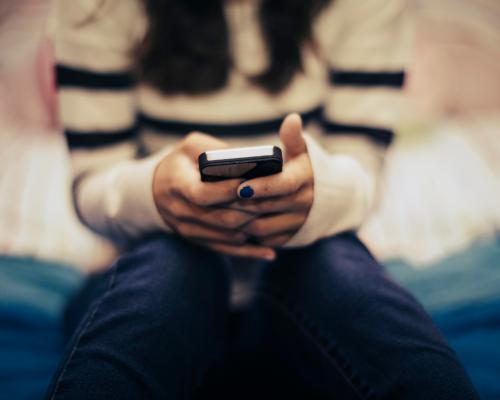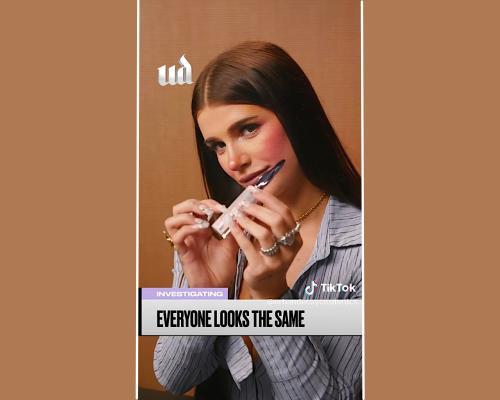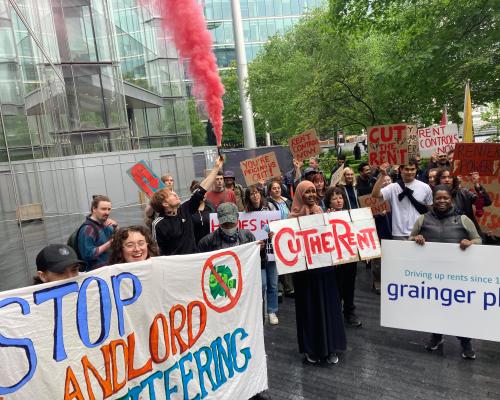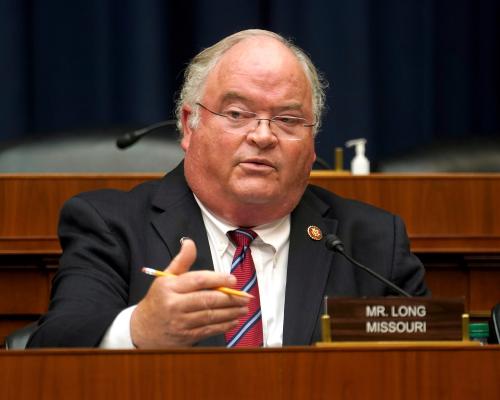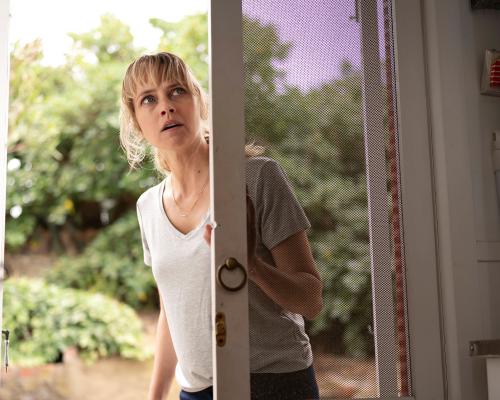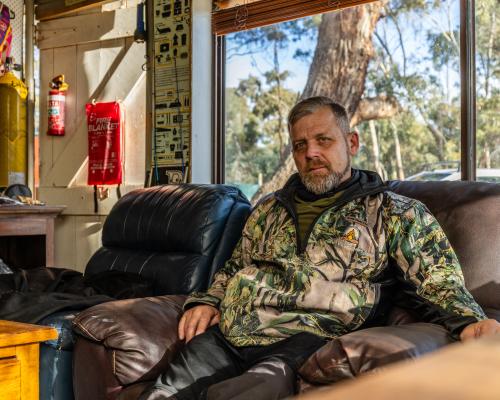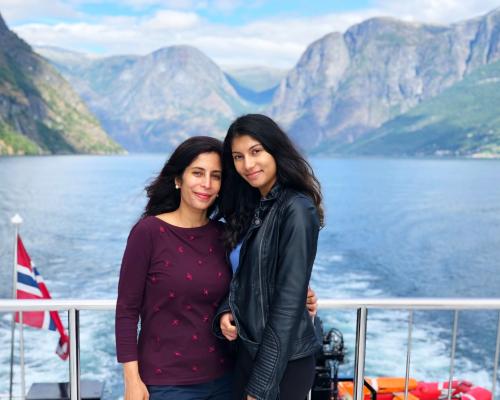
Naina Mishra seemed to turn up at the yoga studio in Euston, north-west London, out of nowhere. She wasn’t referred by anyone; she didn’t come with a friend. A 21-year-old woman of Indian heritage with an American accent who grew up in Hong Kong and had recently arrived in London, Naina just “fell in” off the street in January 2022, say her yoga teachers, Hamish Hendry and Louise Newton. But it became part of her daily life. Every morning, she returned to practise there.
Chatting after class, they learned that Naina had just graduated from university in the US and had been interning at the investment bank Goldman Sachs and the consulting firm McKinsey. She was studying in London before beginning a high-flying job as a business analyst at McKinsey in New York in the autumn. “She was really focused,” Newton remembers. “She would say, ‘My goals are to be a CEO, to have three children, to be married.’ She was really clear on what the future was going to hold for her.” By May 2022, she had left London to embark on her next chapter.
But 18 months later, in November 2023, Naina was back – and she was a different person. “She’d do her posture, then zone out,” Hendry says. When he asked if she was having intrusive thoughts, she told him she didn’t know. “She was like a shadow of herself,” Newton says. “She was here, but out of it, just very slightly.”
Throughout 2024, Naina kept changing address. She began to say strange things. “She was determined she was going to live in a specific house on Highbury Fields and said she’d contacted the owner to say that she wanted to live there,” Newton tells me. After a conversation with Hendry about a high-end yoga-wear brand, she told them she had bought every item in the range. One day, Naina announced she’d bought the entire range of Jellycat stuffed toys.
Then, in August 2024, Naina messaged Hendry to say people were following her and she had changed her phone number and was going to have to change her name. “I don’t know anyone outside the shala [yoga studio],” she wrote, “so on the rare occasion someone you don’t know asks about me, they should be sent away.”
Hendry and Newton say they “signposted” her to mental health services, but Naina kept changing her phone number, and after the second or third time, they lost contact with her. Just as Naina fell into the studio out of nowhere, she seemed to disappear into thin air.
But somebody was trying to track Naina down: Vandana Luthra, the mother Naina had told Hendry and Newton was dead. The story of Naina Mishra’s final year in London is one of family estrangement and mental health crisis. It shows how ill-equipped we are at recognising the signs of mental illness, and how powerless parents can be if their young adult children say they want to be left alone. For months, Vandana had been going to extraordinary lengths to find Naina, desperately clutching at every straw because she believed her daughter’s life was at risk. And she was right. By October 2024, Naina was dead.
* * *
Vandana speaks to me for many hours, over several days, from her sister’s home in Connecticut, US. She’s on sabbatical from a finance job in Hong Kong while her son has psychiatric treatment here. There’s a history of mental illness in the family, Vandana says – Naina’s grandmother is schizophrenic; her great-grandmother and great-aunt lived with mental health problems.
“Naina always wanted to do things on her own,” Vandana says. “She was someone who did everything herself.” As a child, Naina loved baking cookies, reading books, pretending to be a ninja with her younger brother. But she spoke very little. A teacher at her primary school in Mumbai once called Vandana in to discuss why Naina was so quiet. “She said, ‘You should really quit your job and be there for your child.’” Vandana pauses, ruminating on this memory. “These things stay in my head now, because I don’t have her any more.”
The family moved from Mumbai to Singapore in 2011, then Hong Kong in 2014, by which time Vandana was divorced and bringing up her children as a single mother. She and Naina used to be very close, Vandana says. “By the time she was in high school, she was taller than me. She used to call me Little Mommy.” Gauri Nafrey, a family friend, had known Naina since she was a baby. “As a teenager, Naina was a kind of A-lister: the dress, the makeup, the hair, everything was beautiful,” she tells me. “A complete go-getter: strong, smart, doing really well academically – the works.” After spending summer camp in the US aged 13, Naina decided she was going to settle in New York. At 16, she’d set her mind on a job with McKinsey. She got a place at Northwestern, a competitive university on the outskirts of Chicago, majoring in economics and business entrepreneurship.
In January 2019, during her first year of college, Naina rang Vandana to tell her she had been sexually assaulted by someone the previous September, when she had just arrived in her dorm. “Obviously it was shocking.” Vandana’s eyes are wide. She was at work when she took the call. She walked away from her desk to try to get some privacy. Questions began tumbling out. Were there condoms? Could she have caught diseases? Naina said she managed to escape before it got that far. How could this have happened, Vandana asked.
“Those questions fell badly,” she concedes. “She said, ‘You’re accusing me.’ I was not – I was in a state of shock, just processing that sequence of events.” But Naina hung up and they didn’t speak for a few days. (Naina made a formal complaint about the student who was suspended from college for a year.)
After that, Vandana says, Naina began to change. “She was much more depressed. She kept talking about rape on campus – she wanted me to read everything about it.” Vandana was used to regularly exchanging messages and having calls with her daughter, but now Naina would sometimes go silent for days on end. From halfway across the world, Vandana tried to stay in her daughter’s life. She got one of Naina’s flatmates to help coordinate a surprise birthday party for her 21st in 2021, ordering champagne and food from a restaurant Naina liked. She and Naina still spoke, but not as much.
The trip to London in 2022 was a bit of a jolly that allowed Naina to maintain her student visa before starting work at McKinsey in the autumn. She deliberately picked a literature course that required very little academic work. She did a wine course and a Thai cooking course, as well as all the yoga. “Rich people things,” her mother says, drily. Vandana didn’t mind funding it all – Naina was getting to enjoy her youth and freedom – but wishes she’d paid for it directly. “Then I would have known the places she went to.”
Nafrey and her family had been living in London since 2016, and she invited Naina over one night. “I had not seen her for six, seven years. She was completely different from the Naina I remember: soft-spoken, self-deprecating, nothing fancy about her clothing, no makeup,” she says. “I was, like, what happened to you?”
Naina didn’t mention it to Nafrey, but she had been having sessions with a London-based psychotherapist. In February 2022, she created a Google Drive account and asked Vandana to send over all the pictures she had of her as a very young child. Once they had been received, Naina told Vandana she didn’t want to talk to her for a while. “I am undergoing a difficult treatment for my PTSD and chronic pain. Due to the difficult nature of the treatment, I’m unable to speak with you at this time,” she texted. It was the first time Naina had mentioned PTSD to her mother. (The therapist Vandana says Naina saw in London did not want to participate in this piece, neither confirming nor denying that Naina had seen her, citing patient confidentiality.)
When they finally spoke, it was May 2022. In a three-minute phone call, Naina told Vandana that, when she was three years old, two strangers had raped her in the bathroom of her grandparents’ house in a suburb of Delhi. Vandana was bewildered by this. “My children have never been left alone. There are no strange men coming into my mother’s bathroom. The whole thing was just not plausible.” She knew she’d alienated Naina the last time her daughter had confided in her, and tried to handle things differently. “I said, ‘I’m sorry this happened. How come I didn’t know about it?’ And she said, ‘I couldn’t tell you because you were a bad mother.’” When Vandana asked more questions, Naina hung up.
They kept in touch, mainly over WhatsApp and email, but the abuse was never mentioned again. “My plan was whenever I saw her next, I was going to sit her down and talk to her about it … ” Her voice trails off. She didn’t see Naina again until four days before her death.
After leaving London in 2022, Naina had to sort out the rental agreement for her New York apartment. She insisted she didn’t want anyone to act as a guarantor and begged her father, who was living in Mumbai, and her mother to put enough money into her bank account to reassure her landlord. By this point, Naina’s brother was in mental health crisis, disappearing for 10 days at a time. “There was so much on my plate, so much shit going on all around me,” Vandana says, bitterly. “She’s never blown her money. So I was, like, all right, just give it to her.” About $140,000 (£103,000) went into Naina’s account. “That’s the mistake I made.” Vandana screws up her eyes. “Once she had that huge amount of money in the bank, she cut contact.”
Naina changed her phone number. She stopped replying to her mother’s emails, then changed her email address altogether. Vandana tried to message Naina’s friends on Facebook and LinkedIn, only to find almost all of them had blocked her. One replied, saying Naina was thriving in New York. The books Vandana read on family estrangement and the psychologist she consulted in Hong Kong all said the same thing: give her space and she might reconnect.
For a year and a half, Vandana tried to let Naina be. But it went against every fibre of her being. When a friend was due to visit New York in early January 2024, Vandana asked her to reach out to Naina and take her for coffee. Naina replied saying she wasn’t in New York any more – she’d left McKinsey and moved back to London. “Then I was in full panic mode,” Vandana says. “If Naina can leave her dream job, her dream city, and go to London, something’s very wrong. That was when I unleashed everything possible I could think of to try to find her.”
* * *
Naina did not see a mental health professional during the last year of her life. She had no documented mental health issues, beyond the PTSD diagnosed in New York in 2022. But Vandana’s experience with her son’s psychosis left her convinced Naina must be in crisis. Reluctantly, Vandana says, she hired three London-based private investigators (she estimates she spent at least £6,000 on their services). She tried to reach out to Naina’s closest friends once again, emailing them at their work addresses, or appealing to their parents to pass on her messages. The mother of one of Naina’s high school friends refused, saying if her daughter had chosen to block Vandana, she would “respect her boundaries”. The only friend still willing to speak to Vandana revealed that Naina seemed to have cut herself off from everyone. She had quit social media; she wasn’t in any of the pictures from a close friend’s wedding.
Through an acquaintance at McKinsey, Vandana learned that Naina had spent half the year she’d been working at the company signed off on disability leave. She contacted McKinsey’s director of HR, explaining that she was estranged from Naina but concerned for her mental wellbeing, and asked if they could share the reason Naina was on leave, and anything about her current whereabouts. Vandana was told privacy laws prevented them from giving her this information. (McKinsey declined to comment for this piece.)
Only one of the three private investigator agencies could find out anything about Naina’s life in London. By mid-January 2024, they had provided an email address, a UK phone number and an address in Walthamstow, east London. Vandana immediately packed a suitcase with a change of clothes and food she knew Naina loved – paneer, pesto, sun-dried tomatoes – boarded a flight and headed straight there.
It was a small house. “Such a dingy place,” Vandana says. She learned the rooms were all rented on Airbnb, and Naina was no longer there. She checked into a nearby hotel, lay on the bed, and had a panic attack. “The walls and the ceiling were collapsing on me. But I just had to keep trying.”
A hotel receptionist let Vandana borrow her phone to ring Naina’s number. Naina answered, but hung up when she heard Vandana’s voice. The receptionist suggested asking the police to do a welfare check. They were reluctant, Vandana says, but she begged them. “I said, ‘As a mother, I know something is wrong with my daughter. Please hear me out.’” When an officer contacted Naina, she informed them her mother was dead. “That’s what they told me,” Vandana says. “I said, ‘No, that’s not right – I have my passport with me, her birth certificate, you can see my name on it.’” Vandana returned home, her bags still packed with food.
In a statement, the Metropolitan police said, “When officers attended Ms Mishra’s address she told them she did not wish to have any contact with the person who had reported the concerns. As she was an adult and officers had no concern for her welfare, her wishes were respected.” It was a rationale Vandana would hear again and again: Naina was over 18, she was not in obvious crisis, she had a right to privacy.
A missing people’s charity told Vandana they couldn’t do anything without a police report. The two lawyers she consulted said there was no chance of her getting any kind of guardianship over Naina without firm evidence that she was unable to take care of herself. The Indian consulate could not help. The therapist Naina had seen in London in 2022 refused to speak to her family without Naina’s consent. Vandana emailed two sisters the private investigator said were subletting a different flat to her daughter, enclosing a photo of her and Naina together. “Even if she does not want to talk to anyone, at least I should know she is safe,” Vandana wrote. The women replied saying Naina had left some time ago, they had never met her and were unnerved to have been tracked down like this. Increasingly desperate, Vandana returned to London and visited a nail salon Naina had recently reviewed online, asking staff to alert her if her daughter ever made another booking. They never did.
Vandana recruited old friends from India now living in the UK to be her eyes on the ground. As well as Nafrey, she reached out to Karuna Kapoor, whom she’d known for over 30 years but who had never met Naina. Every time the private investigator supplied a new address, Nafrey would travel from her home in Fulham, south-west London, to walk her dog around the property and see if she could spot Naina; Kapoor would travel from her home in St Albans in Hertfordshire to do the same. Naina’s father travelled to London and spent hours waiting outside one address, only to learn Naina was no longer there. Vandana paid a domestic worker £20 an hour to keep another property under surveillance.
If Naina was in a paranoid state of mind, she had good reason to be: she was being followed and tracked. Vandana accepts this, but feels she had little choice. “I wanted to see what she was doing in London. If she was all good – if she had a job, a social network – I’d have let her be.” Vandana shakes her head: “2024 was a year I did not sleep. There was so much stress and helplessness. I was constantly thinking, what more I can do?”
Then, on 19 October, when Vandana was at her parents’ home just outside Delhi, her phone rang. The name on the screen said Naina. “I had a number saved, which the private investigator had given me.” Vandana shuts her eyes. “It was 4am UK time. I picked up.” For the first time in years, she heard her daughter’s voice.
“Mum,” Naina said, “will you help me? I’m in danger.”
* * *
Vandana tried to sound calm. “Of course I will help you,” she said. “Where are you?” Naina said she was at home in her flat, with the doors locked. She wanted her mother to verify her identity. “Tell me something only you would know,” Naina said.
“I told her where she was born, when we moved to Singapore. I actually said, ‘You were sexually assaulted when you first arrived in college,’” Vandana remembers.
Identity confirmed, Naina told her the street outside her flat was filled with black cars, and people dressed in black were waiting to kidnap her. Her mother told her to call the police. “They won’t help me,” Naina said.
“All I wanted to do was make sure she stayed inside her apartment until Gauri could come and pick her up,” Vandana says. She tried to contact Nafrey and her husband but, at 4am, they weren’t responding. Naina suddenly wanted to speak to everyone: her brother, her grandmother, old friends. “These girls decided not to have any contact with me,” Vandana says, bitterly, of Naina’s friends. “When Naina messaged them to say she was in danger, did any of her friends rush to help her?” By 9.30am UK time, Vandana had bought a ticket to fly to London. By 6.30pm, she was on a plane.
“I woke up and saw six missed calls from Vandana – and then I saw missed calls from Naina,” Nafrey tells me, still in disbelief. There were texts from Naina, too, saying she wasn’t safe and asking Nafrey to pick her up “as soon as you are able”. Nafrey rang Vandana, who advised her not to ask Naina any questions. “I literally got up, put my jeans on and ran. I was overjoyed – it was what we’d been wanting to happen,” Nafrey says.
Vandana, too, felt joy and relief – but it was mixed with fear about her daughter’s mental state. She reassured herself that she already knew the psychiatrist in Hong Kong who was treating Naina’s brother. “I knew what to do. I had to just remain calm and get her home.”
Nafrey drove to Naina’s address. There was no fleet of black cars outside, nor people dressed in black. When Naina came to open the door to Nafrey – a woman she’d known since she was a baby – her face was completely blank. “No recognition, no hint of emotion at all.” Nafrey tried to hug her: “It was like hugging a statue.”
Naina had been packing. Her organisation was meticulous: each individual sock was carefully folded, then placed in a specific bag. The kitchenette was full of expensive Japanese ingredients and obscure wholegrains. It took an hour for her to be satisfied that everything had been correctly packed. “Where are we going? Am I going to be OK?” Naina asked in Nafrey’s car. “She was like a lost child,” Nafrey says.
She had plans that meant she could only look after Naina in the morning, so Kapoor agreed to collect her and look after her until Vandana arrived in London. “My first impression was that she was very quiet. There was almost a translucent quality to her, ethereal. You felt like holding her gently,” Kapoor remembers. “But within a minute, I could tell she was not OK. She was so within herself, and absolutely frightened.”
When she arrived at Kapoor’s home in St Albans, Naina told Kapoor her daughter was an impostor. “She said, ‘I know she’s not 13 and I know she’s a spy. You’ve trained her really well. She’s a really good actor.’” She said that the dog – a soppy, sandy-coloured cockapoo called Ziggy – was also a spy. She inspected the corner of every room for hidden cameras. She told Kapoor that she knew there was a camera concealed in her necklace. Kapoor went upstairs and took all her jewellery off.
At bedtime, Naina asked Kapoor to hug her to sleep. “She was like a seven- or eight-year-old,” Kapoor says. “I held her tight. She was lying down and I was just stroking her hair. Then she said, ‘Why do you keep touching me all the time?’ I said, ‘I’m really sorry.’ I didn’t want to say, ‘But you just asked me to hug you 10 minutes ago.’” At 3am, Naina tried to open the patio doors and walk into the garden. She asked Kapoor if this really was a neighbourhood and not some kind of film set. They fell asleep together on the sofas in the living room. In the morning, Kapoor’s husband discovered Naina had come upstairs with her pillow and blanket, and fallen asleep next to him.
“How is it that anybody who interacted with Naina had not picked up on the fact that she was very unwell?” Kapoor shakes her head. “You could see that this person was not OK.”
Vandana arrived at Kapoor’s the next morning. She was struck by how fragile her daughter looked. “Her skin was like glass. She was so thin, so fair, so shining – like bone china.” Vandana went to hug her, but Naina looked at her in disgust. “She said, ‘Are you going to take my teeth out? Are you going to take my eyes out?’” Naina demanded Vandana open her mouth so she could check her teeth, running her finger over her mother’s molars: “I just followed her instructions and stood there.” Somehow reassured, Naina sat down on the sofa with her mother. “I said, ‘I’m so happy to see you, Naina. I’ve come to take you home, and you will be safe.’”
They went for a walk in a park near Kapoor’s house. “Suddenly she said, ‘Mum, you’ve not even hugged me!’ So I just stood still, and I hugged her and I hugged her.” Vandana’s eyes shine at this memory. “People are walking past us, and the two of us are just hugging in the middle of the park. It was lovely.”
* * *
Naina didn’t want to return to Hong Kong without her college diploma. It was in a box in the storage unit she’d been renting, she explained, but it was Sunday and it wasn’t open until the next day. The following morning, when Naina pulled up the door to her unit, Vandana’s heart fell: there were dozens of huge cardboard boxes, stacked from floor to ceiling, taking up every inch of space. One contained 100 dishcloths, neatly folded, labelled and placed in Ziploc bags. Another held six different Longchamp shoulder bags. There was a vacuum cleaner, dozens of ice-lolly moulds, expensive storage jars, an air fryer, designer boots and yoga wear, and boxes and boxes of Jellycat toys.
Vandana stared in disbelief, but Naina told her not to worry: everything was labelled. She had a spreadsheet documenting everything she owned – down to every nail file and pair of tweezers – the box it was stored in and the room in her future home where it would finally be unpacked. Throughout 2024 she had spent tens of thousands of pounds on things to fill her dream home in London. They found her diploma, gathered clothes appropriate for the Hong Kong heat and left the rest.
They landed safely in Hong Kong the next morning, a Tuesday. On the train from the airport, Naina seemed lucid. “What will I tell people?” she asked. “That you’re taking care of your mental health,” Vandana replied. An appointment with a psychiatrist was booked for Saturday morning, and Naina had agreed to go. She started talking about how great her résumé was – she’d worked at Goldman Sachs and McKinsey, after all, so she should easily be able to get a job in Hong Kong. Vandana tells me this between deep sighs. “She was planning her life. She was not suicidal.” On the Thursday night – during a few seconds when Vandana was in the bathroom and not with her – Naina ended her life.
“My daughter is gone, despite everything I did,” Vandana says now. “I don’t know how bad her situation would have been if she had remained alive, but I had her right in front of me. I had her in my hand. And from my hand, she’s gone.”
* * *
In the days after Naina’s death, Vandana’s brother and brother-in-law managed to log into her computer. They were looking for any documentation to demonstrate to the authorities that Naina had been mentally ill when she died. They found her psychotherapy bills, and text messages she had sent to her former friends – texts Vandana shared with me. What Naina said in them, and how her friends reacted, show both her state of mind and how ill-equipped they were to deal with it.
“I’ve gone mad,” Naina messaged a close friend in February 2022, around the time she was asking Vandana for baby pictures from London. “I keep talking to the imaginary friends who came into my head when I was 12 and now my therapist tells me it’s not normal.” One of the voices was telling her to kill herself, she said.
“Just remember how strong and loved you are. You can get through this!!” the friend replied. “Get rid of all the negative voices by replacing them with a million ‘I love you’s okay???”
There were texts to three friends in May 2022 in which Naina said the sexual abuse she remembered suffering in early childhood had been perpetrated by family members. But she gave different accounts of who was responsible to each of them. She told one she could remember being abused when she was six months old.
I approached four of Naina’s friends; only one – a close friend from college – agreed to speak to me, on condition of anonymity. She told me she and another college friend had done what they could to support Naina when she spoke to them about her memories of abuse. “We were doing our best. I don’t think we were doing a bad job, but we were having to therapise for something we were not trained for. And she was seeing a therapist, so it felt like she was being taken care of,” the friend says. Naina had been planning to cut herself off from her family for six months, she adds. “Naina had asked me not to talk to her mom, and I agreed – from what I heard, they had done terrible things to her.”
The friend saw Naina for the last time when she visited her in New York in spring 2023. Naina was on medical leave from work, but was feeling optimistic, her friend says. “It was a fun visit. We did tourist things together. At the end, she told me that when she started her job, it was possible that she might be busy with work, and that I shouldn’t take it personally if we lost touch – she’d love and cherish me for ever. I wanted to respect her boundaries. I wished her well and we texted here and there but we didn’t speak again.” When she first heard the news, she didn’t believe Naina was gone. “I think about whether there are things I missed. I wonder whether she was in the right type of therapy. She needed someone to notice something that the rest of us didn’t.”
I feel sorry for Naina’s friends. They were young and clearly wanted to help Naina and respect her wishes. When I put this to Vandana, her voice turns to ice. She says she can only “have sympathy for their ignorance”.
In the end, Naina had no friends; her messages in 2024 were only to the people who taught her yoga. “Naina fell through our fingers,” Newton tells me, her palms pressed together, her fingers splayed. “I wish I’d tried to meet up with her, or find out where she lived, or who her parents were. I wish I had tried a bit more.”
No one at the yoga studio knew how to recognise psychosis. “I’d never been in contact with it before,” Newton says. “Even now, I’m not clear what services I have access to. Where do I go? Who do I go to?” She sighs.
Nafrey and Kapoor arranged for Naina’s boxes to be shipped from the storage unit in London to Hong Kong. They are now stacked up in her bedroom. Vandana has no idea what to do with them.
“People have to know what mental illness is. I want to make sure high schools all over the world teach kids to recognise psychosis,” Vandana says. “At every point, somebody or other came in contact with her who could have helped. I want Naina’s story to go far and wide. She died because the people around her were ignorant.”

